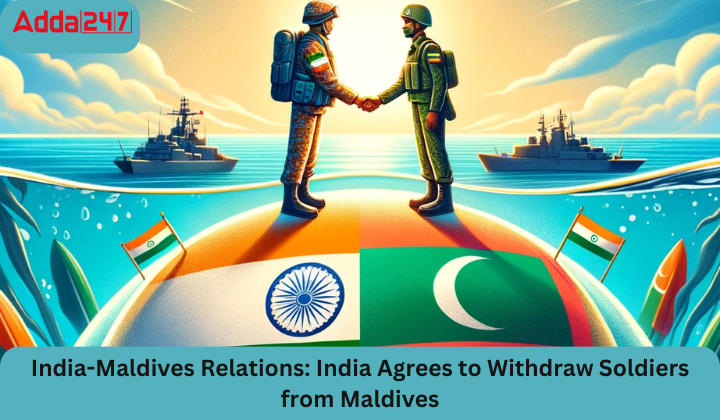Table of Contents
A recent announcement by Maldivian President Mohamed Muizzu regarding India’s agreement to withdraw its soldiers from the Maldives marks a significant turn in the complex geopolitical dynamics of the Indian Ocean region. This development is not just a bilateral issue between India and the Maldives but is also reflective of the larger strategic shifts in South Asia and the Indian Ocean region.
Withdrawal of Indian Troops from Maldives
President Mohamed Muizzu’s announcement regarding India’s agreement to withdraw its military personnel from the Maldives marks a significant turn in bilateral relations between the two countries.
The discussion in Dubai between Muizzu and Indian Prime Minister Narendra Modi indicates ongoing negotiations about the presence of Indian military assets, including helicopters and operational aircraft, in the Maldives.
Indian Military Presence in the Maldives
India’s military presence in the Maldives has been primarily for strategic and humanitarian purposes. The Indian military has been involved in various operations, ranging from surveillance to humanitarian assistance and disaster relief.
Maldives’ Request for Withdrawal
The request by the Maldivian President for the withdrawal of Indian troops is rooted in the internal political dynamics of the country and the ‘India Out’ campaign, which gained traction during Muizzu’s election campaign.
This campaign reflects a segment of the Maldivian population’s concern over perceived threats to their national sovereignty.
Contextualizing the Request for India-Maldives Ties
The request for troop withdrawal must be seen in the larger context of the shifting political landscape in the Maldives and its impact on foreign policy, especially concerning India and China.
Historical Overview of India-Maldives Relations
The relationship between India and the Maldives has been historically strong, with India considering the Maldives within its sphere of influence.
This relationship has, however, experienced ups and downs, particularly with the changing political leadership in the Maldives.
China Factor
China’s growing influence in the Maldives, especially during Abdulla Yameen’s presidency, has been a concern for India.
Yameen’s alignment with China’s Belt and Road Initiative (BRI) indicated a significant shift in the Maldives’ foreign policy, moving away from India’s sphere of influence.
Recent Political Developments in the Maldives
The election of Muizzu in 2023, following an ‘India Out’ campaign, reflects a potential realignment in the Maldives’ foreign policy.
This development poses challenges for India, which has traditionally seen the Maldives as a key strategic partner in the Indian Ocean.
Geo-Strategic Importance of the Maldives to India
The Maldives’ location in the Indian Ocean makes it strategically significant for India. It serves as a crucial point on maritime routes and can potentially influence the regional power balance.
‘The String of Pearls’ and India’s Concerns
The concept of the ‘String of Pearls’, which refers to Chinese efforts to increase its maritime presence in the Indian Ocean, is a major concern for India. The Maldives plays a critical role in this geopolitical strategy.
Bilateral Issues and India’s Efforts
Despite the challenges, India has made concerted efforts to maintain and strengthen its relationship with the Maldives. These efforts include diplomatic engagement, economic aid, and infrastructural development projects.
Steps Taken by India for Friendly Relations
India’s approach towards the Maldives in recent years has been multifaceted, focusing on development partnerships, people-to-people ties, and strategic cooperation. India has also been responsive to the Maldives’ economic and security needs.
Maldives Geographical Position
The Maldives is an archipelago located in the Indian Ocean, south-southwest of India, highlighting its strategic importance in regional geopolitics.
The Eight Degree Channel is what separates the Maldives from the Indian Union Territory of Lakshadweep. This geographical proximity underscores the importance of understanding and managing maritime borders and security concerns in the region.
Conclusion: Navigating a Complex Relationship
India’s relationship with the Maldives is at a critical juncture. Balancing the strategic interests and respecting the sovereignty of the Maldives while countering China’s growing influence will be a delicate task for India. The ongoing situation demands nuanced diplomacy, strategic foresight, and a deep understanding of the regional geopolitical landscape. As India and the Maldives navigate this complex relationship, the outcome will have significant implications for regional stability and power dynamics in the Indian Ocean region.



 TSPSC Group 1 Question Paper 2024, Downl...
TSPSC Group 1 Question Paper 2024, Downl...
 TSPSC Group 1 Answer key 2024 Out, Downl...
TSPSC Group 1 Answer key 2024 Out, Downl...
 UPSC Prelims 2024 Question Paper, Downlo...
UPSC Prelims 2024 Question Paper, Downlo...




